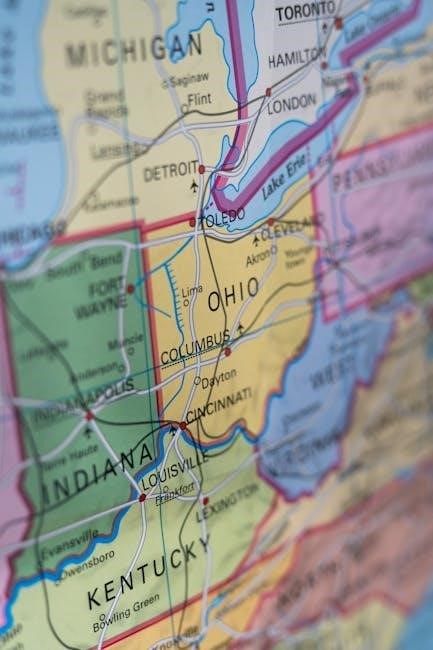This study guide provides resources and questions to help study for a quiz on the American Revolution with key topics and events to understand the revolution fully always.
Causes of the Revolutionary War
The American Revolution was sparked by a series of events and policies that led to growing tensions between the British government and the American colonies. The French and Indian War had a significant impact on the colonies, as Britain’s debt from the war led to increased taxation on the colonies. The Proclamation of 1763, which prohibited colonists from settling west of the Appalachian Mountains, also contributed to the growing unrest. Other factors, such as the Stamp Act, the Townshend Acts, and the Boston Massacre, further fueled the flames of rebellion. The colonists began to feel that their rights as British subjects were being violated, and that they had no say in the governance of their own lands. This led to the formation of groups such as the Sons of Liberty, who played a key role in organizing resistance against British policies; The stage was set for a full-blown revolution, with the colonies seeking independence from Britain. The causes of the war were complex and multifaceted, involving political, economic, and social factors.

Key Events Leading to the War
Events like the Boston Tea Party and the Intolerable Acts led to the war with various protests and boycotts always happening then.
The French and Indian War and its Impact
The French and Indian War was a significant event that led to the American Revolution, with Great Britain and the colonists fighting against the French and Native Americans. The war resulted in Great Britain gaining control of a large amount of land, but also left them with a significant amount of debt. The British government expected the colonists to help pay for the debt, which led to tensions between the two groups. The Proclamation of 1763 was issued, which prohibited colonists from settling west of the Appalachian Mountains, further increasing tensions. This event had a lasting impact on the relationship between Great Britain and the colonists, ultimately contributing to the outbreak of the American Revolution. The war marked a turning point in the history of the colonies, as they began to develop their own identity and resist British rule. Various historical documents and records provide evidence of the war’s impact on the colonies.

Key Figures of the American Revolution
Notable leaders played a crucial role with important contributions to the revolution’s success always happening.
Samuel Adams and the Sons of Liberty
Samuel Adams was a prominent leader of the Sons of Liberty, a group of patriots who played a crucial role in organizing resistance against British policies. He was a skilled politician and organizer who helped to mobilize public opinion against the British. The Sons of Liberty was a loose network of colonial patriots who were determined to defend their rights and liberties against British tyranny. They were known for their daring raids and protests, including the famous Boston Tea Party, which was a pivotal event in the lead-up to the American Revolution. Adams and the Sons of Liberty were instrumental in spreading revolutionary ideas and mobilizing support for the cause of independence. Their efforts helped to galvanize public opinion and pave the way for the outbreak of war in 1775. The legacy of Samuel Adams and the Sons of Liberty continues to be celebrated as an important part of American history.

Understanding the American Revolution
This section provides an overview of the revolution with key concepts and terminology to understand the topic fully always with online resources.
Defining a Revolution and Key Concepts
A revolution is defined as a group of people working together to overthrow a government, with the goal of creating a new system or order. This concept is central to understanding the American Revolution, as it was a colonial revolt that sought to establish independence from Great Britain. Key concepts such as liberty, freedom, and self-governance are also essential to understanding the revolution. The idea of liberty, for example, refers to the freedom of individuals to make their own choices and live their lives as they see fit. The concept of freedom is also closely tied to the idea of self-governance, which refers to the ability of a people to govern themselves without external interference. These concepts are crucial to understanding the motivations and actions of the individuals involved in the American Revolution, and are still relevant today. The study of these concepts can be facilitated through the use of online resources and study guides.

Study Guide Overview and Resources
This study guide provides a comprehensive overview of the American Revolution, including key events, figures, and concepts. The guide is designed to help students prepare for quizzes and tests, and includes a range of resources such as flashcards, summaries, and practice tests. Additionally, the guide includes links to online resources, such as SparkNotes, which provide in-depth analysis and study materials. The guide is organized into sections, each covering a specific topic or time period, making it easy to navigate and find the information you need. By using this study guide, students can gain a deeper understanding of the American Revolution and its significance in American history. The guide is also a useful resource for teachers and instructors, providing a range of materials and activities to support classroom instruction. Overall, this study guide is a valuable tool for anyone looking to learn more about the American Revolution.
